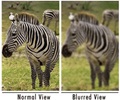The University of Nottingham in England has come up with novel therapies that may drastically reduce treatment times for amblyopia, more commonly known as 'lazy eye'.
The Visual Neuroscience Group in the university's School of Psychology says that the new treatments may also help treat amblyopia in adults.Occlusion therapy - patching the normal eye for lengthy periods to 'train' the affected eye - is currently the main treatment for amblyopia. But it can be distressing to children, is unpopular with parents, and can adversely effect educational development.
The researchers say that early results of their research have shown that gains, which would have required around 120 hours of occlusion therapy to achieve, can be produced after just 10 hours with their new treatments.
Adult test subjects have undertaken challenging visual tasks under computer-controlled conditions.
The researchers are of the opinion that the promising results of the study may be used to develop a child-friendly game that could treat amblyopia. They also see the potential to use such new treatments to supplement occlusion therapy.
Besides looking at potential treatments for the condition, the 60,000-pound project also examines the level of neural plasticity in the adult brain - the ability of a neural system to change with experience.
Advertisement
The researchers believe that the results of this study may be translated to other conditions where recovery is limited due to restricted neural plasticity - including brain tumours, stroke, degenerative diseases and trauma.
Advertisement
Source-ANI
PRI/SK









